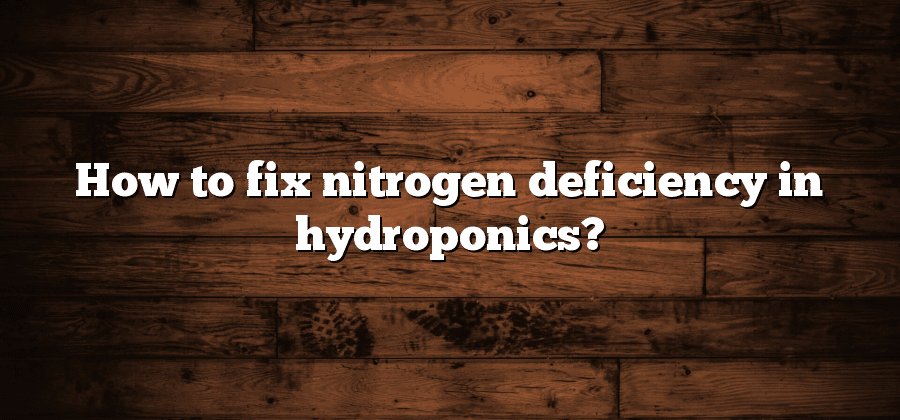Understanding Nitrogen Deficiency in Hydroponics
Nitrogen deficiency is a common issue that hydroponic growers may encounter. Understanding the causes and effects of this deficiency is crucial for maintaining optimal plant health and maximizing yields in a hydroponic system.
Plants require nitrogen for various essential functions, including protein synthesis, cell division, and photosynthesis. In a hydroponic setup where plants rely on nutrient solutions for their growth, ensuring an adequate supply of nitrogen is vital. When plants do not receive enough nitrogen, they exhibit characteristic symptoms that can hinder their growth and development. Recognizing these symptoms is the first step in addressing the issue and providing the necessary nutrients to promote healthy plant growth in hydroponics.
Importance of Nitrogen in Hydroponic Systems
One of the key nutrients required for healthy plant growth in hydroponic systems is nitrogen. Nitrogen plays a crucial role in various physiological processes, making it an essential element for plant development. It is a key component of proteins, nucleic acids, and chlorophyll, all of which are vital for plant growth and overall productivity.
Nitrogen is responsible for promoting vigorous leaf and stem growth, ensuring proper photosynthesis, and aiding in the synthesis of amino acids and enzymes. By promoting the production of these essential compounds, nitrogen helps plants to efficiently convert light energy into chemical energy, which fuels their growth and development. Furthermore, nitrogen also enhances the plant’s resistance to disease and stress, making it an important nutrient for maintaining the overall health and vitality of plants in a hydroponic system.
Identifying Symptoms of Nitrogen Deficiency
Symptoms of nitrogen deficiency in a hydroponic system can be easily identified if you know what to look for. One of the first signs is the stunted growth of plants. Nitrogen is a crucial nutrient for plant growth and development, and without an adequate supply, plants will struggle to reach their full potential. Another common symptom is the yellowing or chlorosis of leaves, particularly the older ones. Nitrogen plays a vital role in chlorophyll production, which is responsible for the green color of leaves. Therefore, a lack of nitrogen can lead to a loss of leaf greenness, resulting in a yellowish appearance. Additionally, plants experiencing nitrogen deficiency may exhibit a reduction in leaf size and overall vigor.
Apart from visual cues, there are other indicators that can help in identifying nitrogen deficiency. One such indicator is the slow progression of plants through their life cycle. If you notice that your plants are taking longer than usual to grow or flower, it could be a sign of insufficient nitrogen. Another clue is the minimal or lack of new growth, as nitrogen deficiency can hinder the development of new leaves and shoots. Lastly, nitrogen-deficient plants might show an increased susceptibility to diseases and pests. Nitrogen is involved in the production of structural proteins and enzymes that protect plants from various pathogens and insects. Therefore, a deficiency in this nutrient can weaken the plants’ defense mechanisms, making them more vulnerable to attacks.
In conclusion, a keen eye and a thorough understanding of the symptoms can help identify nitrogen deficiency in hydroponic systems. By promptly recognizing these signs, growers can take the necessary steps to address the issue and ensure their plants receive the adequate nitrogen they require for optimal growth and health.
Analyzing the Root Causes of Nitrogen Deficiency
The occurrence of nitrogen deficiency in hydroponic systems can significantly impact plant growth and overall productivity. Understanding the root causes behind this nutrient deficiency is crucial to effectively addressing the issue and maintaining optimal plant health. Several factors contribute to the insufficient supply of nitrogen in hydroponic systems, including inadequate nutrient solutions, poor plant uptake, and imbalances in nutrient ratios.
One common root cause of nitrogen deficiency in hydroponic systems lies in the composition and concentration of the nutrient solution. If the solution lacks adequate nitrogen content or if the plants are unable to access and absorb the nitrogen properly, it can lead to deficiencies. Additionally, imbalances in nutrient ratios can interfere with the assimilation and absorption of nitrogen by the plants. Therefore, careful monitoring of the nutrient solution composition and ratios is essential to prevent nitrogen deficiency in hydroponic systems.
Moreover, poor plant uptake and utilization of nitrogen can also be a contributing factor to deficiency. Factors such as root damage, diseases, or stress can affect the plants’ ability to absorb nitrogen effectively. Inadequate root development or damage can limit the plant’s ability to absorb nutrients, including nitrogen, from the nutrient solution. Thus, maintaining healthy root systems and preventing any stress or damage is vital in ensuring optimal nitrogen uptake and utilization in hydroponic systems.
Choosing the Right Nitrogen Supplement for Hydroponics
When it comes to hydroponics, ensuring your plants receive the right nutrients is key to their overall health and productivity. Nitrogen, in particular, plays a vital role in supporting plant growth and development. However, in some hydroponic systems, the naturally occurring nitrogen levels may not be sufficient to meet the plants’ needs. This is where nitrogen supplements come into play, providing an additional source of nitrogen to optimize plant nutrition.
Choosing the right nitrogen supplement for your hydroponic system requires careful consideration. First and foremost, it is important to select a supplement that is specifically formulated for hydroponic use. These supplements are designed to be readily available and easily absorbed by plants grown in soilless systems. Additionally, look for a supplement that offers a balanced nitrogen ratio, such as a 3-1-2 or 4-2-3. This ensures that the nitrogen is complemented by other essential nutrients, promoting overall plant health and preventing nutrient imbalances. It is also advisable to choose a supplement that is made from high-quality ingredients, as this can have a significant impact on the effectiveness and stability of the product. By selecting the right nitrogen supplement, you can provide your hydroponic plants with the necessary nutrients for optimal growth and yield.






